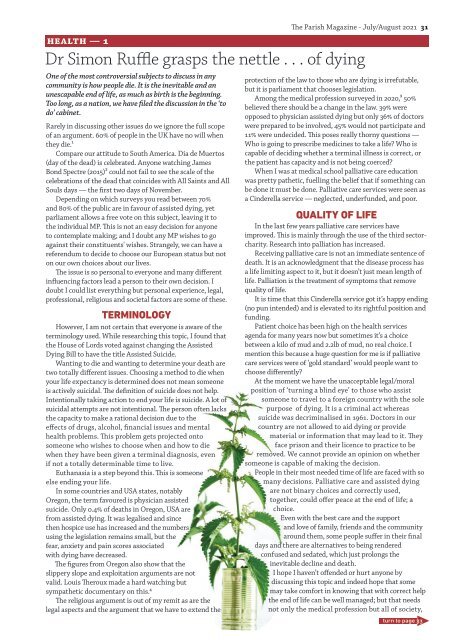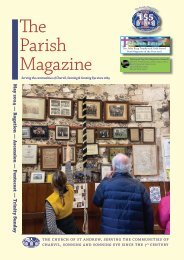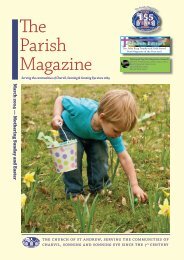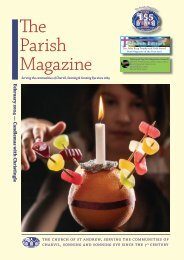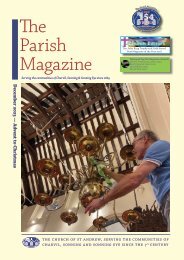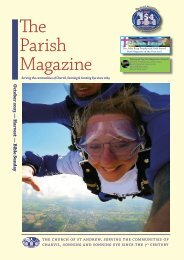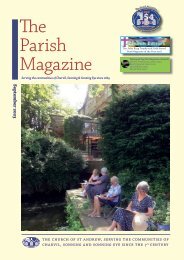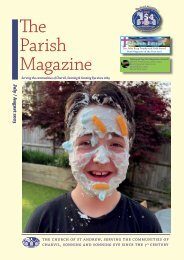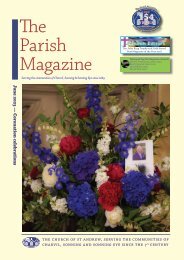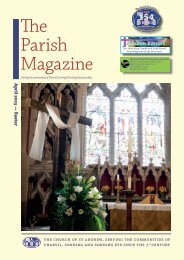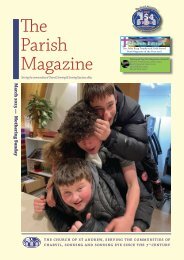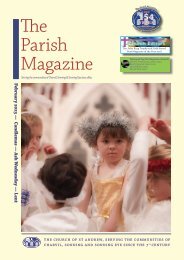The Parish Magazine July and August 2021
Serving the communities of Charvil, Sonning and Sonning Eye since 1869
Serving the communities of Charvil, Sonning and Sonning Eye since 1869
You also want an ePaper? Increase the reach of your titles
YUMPU automatically turns print PDFs into web optimized ePapers that Google loves.
<strong>The</strong> <strong>Parish</strong> <strong>Magazine</strong> - <strong>July</strong>/<strong>August</strong> <strong>2021</strong> 31<br />
HEALTH — 1<br />
Dr Simon Ruffle grasps the nettle . . . of dying<br />
One of the most controversial subjects to discuss in any<br />
community is how people die. It is the inevitable <strong>and</strong> an<br />
unescapable end of life, as much as birth is the beginning.<br />
Too long, as a nation, we have filed the discussion in the ‘to<br />
do’ cabinet.<br />
Rarely in discussing other issues do we ignore the full scope<br />
of an argument. 60% of people in the UK have no will when<br />
they die.1<br />
Compare our attitude to South America. Día de Muertos<br />
(day of the dead) is celebrated. Anyone watching James<br />
Bond Spectre (2015)2 could not fail to see the scale of the<br />
celebrations of the dead that coincides with All Saints <strong>and</strong> All<br />
Souls days — the first two days of November.<br />
Depending on which surveys you read between 70%<br />
<strong>and</strong> 80% of the public are in favour of assisted dying, yet<br />
parliament allows a free vote on this subject, leaving it to<br />
the individual MP. This is not an easy decision for anyone<br />
to contemplate making; <strong>and</strong> I doubt any MP wishes to go<br />
against their constituents' wishes. Strangely, we can have a<br />
referendum to decide to choose our European status but not<br />
on our own choices about our lives.<br />
<strong>The</strong> issue is so personal to everyone <strong>and</strong> many different<br />
influencing factors lead a person to their own decision. I<br />
doubt I could list everything but personal experience, legal,<br />
professional, religious <strong>and</strong> societal factors are some of these.<br />
TERMINOLOGY<br />
However, I am not certain that everyone is aware of the<br />
terminology used. While researching this topic, I found that<br />
the House of Lords voted against changing the Assisted<br />
Dying Bill to have the title Assisted Suicide.<br />
Wanting to die <strong>and</strong> wanting to determine your death are<br />
two totally different issues. Choosing a method to die when<br />
your life expectancy is determined does not mean someone<br />
is actively suicidal. <strong>The</strong> definition of suicide does not help.<br />
Intentionally taking action to end your life is suicide. A lot of<br />
suicidal attempts are not intentional. <strong>The</strong> person often lacks<br />
the capacity to make a rational decision due to the<br />
effects of drugs, alcohol, financial issues <strong>and</strong> mental<br />
health problems. This problem gets projected onto<br />
someone who wishes to choose when <strong>and</strong> how to die<br />
when they have been given a terminal diagnosis, even<br />
if not a totally determinable time to live.<br />
Euthanasia is a step beyond this. This is someone<br />
else ending your life.<br />
In some countries <strong>and</strong> USA states, notably<br />
Oregon, the term favoured is physician assisted<br />
suicide. Only 0.4% of deaths in Oregon, USA are<br />
from assisted dying. It was legalised <strong>and</strong> since<br />
then hospice use has increased <strong>and</strong> the numbers<br />
using the legislation remains small, but the<br />
fear, anxiety <strong>and</strong> pain scores associated<br />
with dying have decreased.<br />
<strong>The</strong> figures from Oregon also show that the<br />
slippery slope <strong>and</strong> exploitation arguments are not<br />
valid. Louis <strong>The</strong>roux made a hard watching but<br />
sympathetic documentary on this.4<br />
<strong>The</strong> religious argument is out of my remit as are the<br />
legal aspects <strong>and</strong> the argument that we have to extend the<br />
protection of the law to those who are dying is irrefutable,<br />
but it is parliament that chooses legislation.<br />
Among the medical profession surveyed in 2020,3 50%<br />
believed there should be a change in the law. 39% were<br />
opposed to physician assisted dying but only 36% of doctors<br />
were prepared to be involved, 45% would not participate <strong>and</strong><br />
11% were undecided. This poses really thorny questions —<br />
Who is going to prescribe medicines to take a life? Who is<br />
capable of deciding whether a terminal illness is correct, or<br />
the patient has capacity <strong>and</strong> is not being coerced?<br />
When I was at medical school palliative care education<br />
was pretty pathetic, fuelling the belief that if something can<br />
be done it must be done. Palliative care services were seen as<br />
a Cinderella service — neglected, underfunded, <strong>and</strong> poor.<br />
QUALITY OF LIFE<br />
In the last few years palliative care services have<br />
improved. This is mainly through the use of the third sectorcharity.<br />
Research into palliation has increased.<br />
Receiving palliative care is not an immediate sentence of<br />
death. It is an acknowledgment that the disease process has<br />
a life limiting aspect to it, but it doesn’t just mean length of<br />
life. Palliation is the treatment of symptoms that remove<br />
quality of life.<br />
It is time that this Cinderella service got it’s happy ending<br />
(no pun intended) <strong>and</strong> is elevated to its rightful position <strong>and</strong><br />
funding.<br />
Patient choice has been high on the health services<br />
agenda for many years now but sometimes it’s a choice<br />
between a kilo of mud <strong>and</strong> 2.2lb of mud, no real choice. I<br />
mention this because a huge question for me is if palliative<br />
care services were of ‘gold st<strong>and</strong>ard’ would people want to<br />
choose differently?<br />
At the moment we have the unacceptable legal/moral<br />
position of ‘turning a blind eye’ to those who assist<br />
someone to travel to a foreign country with the sole<br />
purpose of dying. It is a criminal act whereas<br />
suicide was decriminalised in 1961. Doctors in our<br />
country are not allowed to aid dying or provide<br />
material or information that may lead to it. <strong>The</strong>y<br />
face prison <strong>and</strong> their licence to practice to be<br />
removed. We cannot provide an opinion on whether<br />
someone is capable of making the decision.<br />
People in their most needed time of life are faced with so<br />
many decisions. Palliative care <strong>and</strong> assisted dying<br />
are not binary choices <strong>and</strong> correctly used,<br />
together, could offer peace at the end of life; a<br />
choice.<br />
Even with the best care <strong>and</strong> the support<br />
<strong>and</strong> love of family, friends <strong>and</strong> the community<br />
around them, some people suffer in their final<br />
days <strong>and</strong> there are alternatives to being rendered<br />
confused <strong>and</strong> sedated, which just prolongs the<br />
inevitable decline <strong>and</strong> death.<br />
I hope I haven’t offended or hurt anyone by<br />
discussing this topic <strong>and</strong> indeed hope that some<br />
may take comfort in knowing that with correct help<br />
the end of life can be well managed; but that needs<br />
not only the medical profession but all of society,<br />
turn to page 33


